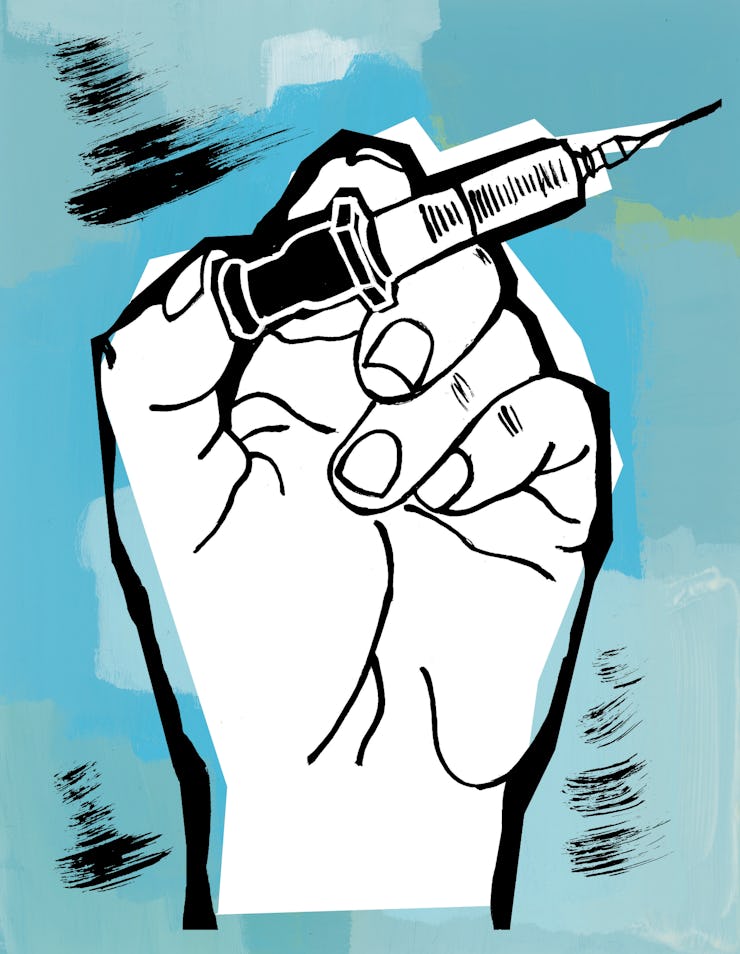Moderna coronavirus vaccine: 2 questions that will determine its future
A preliminary report on Moderna's vaccine has good news. Here's what to look for next.

Preliminary trial results from a front-running coronavirus vaccine candidate were released on Tuesday. After two rounds of vaccination, all 45 people who received Moderna Inc's Covid-19 vaccine produced antibodies. This suggests that their immune systems were spurred into action against the virus — though whether that means those people are protected is still up in the air.
It's good news. It also doesn't mean we're necessarily in the clear. The next step of testing will make-or-break this vaccine candidate by answering two lingering questions.
Moderna's vaccine (called mRNA-1273) is a novel type of vaccine that delivers a tiny bit of SARS-CoV-2's genetic material into the body, and hopefully, trains the immune system to mount a defense.
The vaccine was tested on 45 people between 18 and 55 years old who received a vaccine at 25 μg, 100 μg, or 250 μg. Forty-two people got a booster shot 28 days later.
After the first dose, some participants produced binding antibodies, suggesting that the vaccine stimulated some form of immune system activity. Following the booster shots, scientists detected neutralizing antibodies — the gold standard of antibody, which can stop the virus from infecting cells in lab tests — in all participants.
The results were published Tuesday in The New England Journal of Medicine.
Moderna has been green-lit to enter with the third round of human testing, called a phase III clinical trial. This time 30,000 people will be enrolled. Scheduled to begin on July 27, that trial is targeted towards people in coronavirus hot spots. It is intended to illuminate whether this vaccine helped protect them from getting Covid-19.
That's a huge question to tackle, and it hinges on two smaller questions that may help gauge the vaccine's success:
- What dosage of vaccine is enough to protect someone from Covid-19?
- How long do these antibodies last?
How much vaccine is enough? — Writing in an accompanying commentary, Penny Heaton, director of vaccine development at the Bill and Melinda Gates Foundation, pinpoints a stumbling block that could complicate this upcoming phase III trial:
"Many phase 3 studies fail because of incorrect identification of the dose that best balances safety and efficacy," Heaton writes.
The traditional vaccine development pathway. Moderna has moved through a process that can take up to a decade in 6 months.
From the safety standpoint, we have some concrete data from this trial: The 250μg dosage of the vaccine didn't appear to be more effective than the 100μg dosage but it was linked to more severe side-effects (for instance, one participant reported high fever).
That said, the results indicate that this vaccine appears to be well-tolerated. In the sample of 45 participants, more than half reported mild to moderate side effects including fever, chills, fatigue, swelling, and/or pain at the injection site.
Side-effects like these are not out of line with what is seen in other vaccines, like the flu shot, and they were more common after the second shot was administered — especially in groups given a higher dosage.
That suggests that it will be "prudent" to focus efforts on vaccine dosage that are 100μg and lower going forward, Heaton writes. That 100μg dose will be tested in the upcoming clinical trial. Heaton notes that "the dosing regimen for this mRNA vaccine is still under study."
This report does clearly indicate that it takes two doses of the vaccine to create an immune response similar to those who recover from Covid-19 naturally. That's a key "hallmark" that the vaccine should hit, Anthony Fauci, director of the National Institute of Allergy and Infectious Diseases, explains in response to the report.
"It looks like, at least in this limited, small number of individuals, that is exactly what's happening," Fauci said.
Still, there's a difference producing antibodies, even neutralizing ones, and actually conferring protection. Even in cases of natural infection, scientists are still unsure of how many antibodies need to be produced by the body to fend off Covid-19, Kathryn Edwards, the director of Vanderbilt's Vaccine Research program, tells STAT: "We don’t know how much [antibody] we need to be protected, so we can’t say 'all the participants achieved a protective level.'"
Nailing down how many antibodies we need, and what dosage of vaccine is required to get there, are essential steps toward determining this vaccine's efficacy.
A preliminary report suggests that Moderna's coronavirus vaccine can cause the immune system to produce neutralizing antibodies, but we don't know how much of these antibodies are needed or how long they last.
How long do the antibodies last? – Another question left unanswered by the July 14 New England Journal of Medicine report is how long these antibodies lingered in patients. Antibodies aren't the only marker of how well the immune system fights off Covid-19, but they are a traditional marker used to gauge vaccine efficacy.
In the trial on the Moderna vaccine, participants produced antibodies through day 43, but the report doesn't detail what happened after that. Knowing exactly how long antibodies last is especially crucial considering new, preliminary research that suggests Covid-19 antibodies may only last a few months.
We may not have to wait until the conclusion of the phase III trial to get a partial indicator as to antibody longevity — this report is the first of three scheduled to be published. The next two are expected to indicate how long antibodies produced by the vaccine lasted.
These results appear to be a step in the right direction, but they don't mean too much until we get results from the Phase III trial in hand – which is projected to end on October 27. If all goes to plan and the vaccine is effective, we'll have a new issue to sort out: Making sure we can roll it out to everyone who needs it.